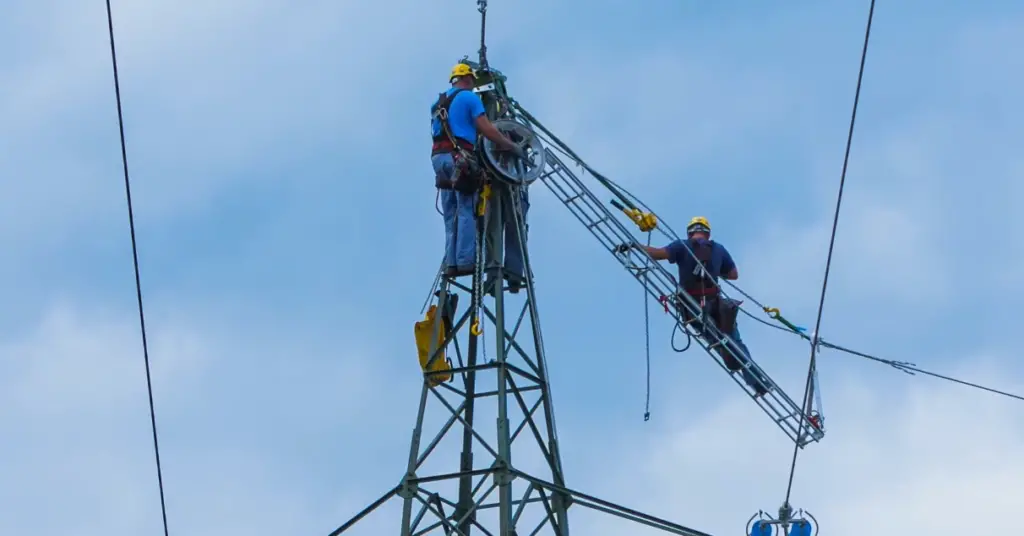According to the Bureau of Labor Statistics, the majority of electricians work full-time schedules. On average, they put in 40 hours per week, but some may work overtime or irregular shifts depending on their job requirements.
Electricians often have physically demanding jobs and may need to climb heights, crawl into small spaces, or lift heavy materials. Due to safety concerns and time constraints, many employers prefer their electricians to work longer shifts rather than multiple shorter shifts.
In addition to regular working hours, electricians also have a responsibility to stay current with continuing education and training opportunities. This may include attending seminars or classes outside of regular work hours.
How Many Week Hours Do U.S. Electricians Typically Work
Minimum 40 Hours Per Week
According to the Bureau of Labor Statistics, the average full-time electrician in the United States works a 40-hour week, with occasional longer hours during peak periods or emergencies. However, many electricians may also choose to work additional hours on a part-time or freelance basis in order to increase their earnings potential.

Outside Factors That Impact The Work Schedule – Weather Conditions And Emergencies
While the standard 40-hour work week is common for electricians, their schedules can also be impacted by external factors such as severe weather and emergency situations. Electricians may need to work longer hours or during odd shifts in order to repair power outages or damaged electrical systems.
Overtime And On-Call Hours May Lead To Extended Work Weeks
In addition to potential emergency situations, electricians may also choose to work overtime or take on-call shifts in order to increase their earnings potential. This can lead to extended work weeks and additional hours on top of the standard 40-hour schedule.
Freelance/Self-Employed Options
Some electricians may also choose to work as freelance or self-employed professionals, which can offer more flexibility in terms of setting their own schedule and choosing the number of hours they work in a given week. However, it is important for these electricians to still comply with labor laws and ensure they are not working excessive amounts of overtime. Overall, the average full-time electrician in the United States works a 40-hour week, but external factors and individual choices can impact their schedules and lead to longer or more flexible work weeks.

Location Matters
According to a 2019 survey by the National Electrical Contractors Association, electricians in the Northeast region of the United States tend to work more hours per week than those in other regions. The same survey also found that union electricians tended to work slightly more hours per week than non-union electricians. Location and employment status can play a role in the number of hours an electrician may work in a given week.
Union Electrician Work Hours Vs. Open Shop Electrician Work Hours
Union electricians may have stricter guidelines for work hours and overtime, as well as a set pay scale for these additional hours. Non-union or “open shop” electricians may have more flexibility in the number of hours they work and how they are compensated for overtime. It is important for all electricians to comply with labor laws and avoid excessive amounts of overtime.

Work Hours Of Apprentice Electricians
Apprentice electricians typically work under the supervision of experienced journeyman electricians, and their work hours may vary depending on the specific apprenticeship program. Some programs require a minimum number of hours per week, while others may have more flexible scheduling options for apprentices to balance their on-the-job training with classroom education.
What Is A Typical Electrician Work Schedule?
There is no set standard for a typical electrician work schedule, as it can vary based on factors such as location, employment status, and external circumstances. The average full-time electrician in the United States works 40 hours per week, with potential overtime or extended hours during emergencies or peak periods. Some electricians may also choose to work additional hours on a part-time or freelance basis, and apprentices may have varying schedules depending on their specific program requirements.

Electricians Who Are Working Weekends
Do Electricians Get Paid For Working Weekends?
According to the Bureau of Labor Statistics, electricians typically work full-time and may have to work evenings and weekends to meet project deadlines or respond to emergencies. The average electrician works about 40 hours a week, but this can vary greatly depending on their field and workload.
Some electricians who specialize in certain areas, such as construction or maintenance, may often work overtime during busy periods. And those who are self-employed may also find themselves working long hours in order to complete jobs and earn more money.
As for whether they get paid for weekends or overtime, it depends on their employment situation and specific contract or agreement with their employer. Some companies offer overtime pay for weekend work, while others do not have such policies in place. Electricians who are union members may also have different pay and benefit agreements for weekend work.

How Much Do Electricians Earn At Weekends?
The amount that electricians earn for weekend work also varies greatly, depending on their job and pay structure. In general, electricians who are paid hourly may earn overtime pay for weekend work, while those who are salaried may not receive any additional pay for weekend hours.
However, experienced electricians in specialized fields or with a successful self-employment business can potentially earn much higher salaries. Additionally, some electricians have access to benefits such as health insurance and retirement plans through their employers.
What Does An Electrician Call Out Mean?
This could be for emergency repairs or to meet project deadlines. Electricians may receive additional pay for callouts, depending on the terms of their employment contract or union agreement.
The amount they earn for weekend work can vary, but experienced electricians in specialized fields can earn higher salaries and potentially gain access to benefits through their employers. A call-out refers to being called for a job outside of regular working hours.

Are There Electrician Jobs That Don’t Require Weekend Working?
Some electrician positions, such as those in maintenance or government work, may not require weekend work. However, other fields such as construction often have demanding deadlines that may require weekend hours. And self-employed electricians may also choose to work weekends in order to meet the needs of their clients and earn more money.
FAQ
What is a normal day for an electrician?
A typical day for an electrician may involve installing, maintaining, and repairing electrical systems in residential, commercial, or industrial buildings. This can include checking wiring, circuit breakers, and other components for safety concerns and potential hazards. Additional tasks may include reading blueprints and following local building codes to determine proper installation methods.
Can electricians work from home?
Some freelance or self-employed electricians may have the ability to work from home on certain tasks such as estimating project costs or completing administrative duties. However, much of the job involves being on-site to physically install and maintain electrical systems.
Where are the highest-paid electricians?
Electricians in Alaska, Hawaii, and the District of Columbia generally have the highest average salaries in the United States. Additionally, electricians working in industries such as oil and gas extraction or pipeline transportation tend to earn higher wages on average.
Do electricians wake up early?
This can vary depending on the specific job and schedule. Some electricians may start their day early in the morning to beat traffic or work at a construction site, while others may have later morning or afternoon shifts. Employers typically strive to schedule work hours that are most efficient for both the electrician and the client.
Additionally, emergencies may require electricians to be available outside of typical work hours. This can include responding to power outages or fixing electrical problems during off-hours for businesses that cannot afford interruptions in operations.
Is being an electrician worth it?
This is a personal decision that varies for each individual. However, electricians often have job security and the opportunity to progress in their careers through certification and specialization options. The Bureau of Labor Statistics also predicts a 9% job growth for electricians from 2019-2029, which is faster than average compared to other occupations.
Additionally, electricians typically earn competitive salaries and benefits packages. It is important to consider the physical demands and potential hazards of the job when making this decision. Proper training, safety precautions, and following regulations can help minimize these risks.
How stressful is being an electrician?
Electricians may face physical demands, time constraints, and potential hazards while on the job. However, proper training and following safety precautions can help minimize these risks. Other stress-inducing factors may include working with difficult clients or dealing with emergencies. Time management skills and effective communication can help electricians handle stressful situations effectively.
Can electricians make 6 figures?
Yes, electricians have the potential to earn six-figure salaries. This often depends on factors such as job experience, specialization, location, and industry. Additionally, being self-employed or owning a business can potentially lead to higher earnings. Electricians may also have opportunities for advancement through completing additional certification programs or continuing education courses. Overall, electricians have the potential to reach high levels of income in their careers.
Is the electrician hard on the body?
Electricians work a physically demanding job and often have long hours. The Bureau of Labor Statistics reports that electricians worked an average of 40.6 hours per week in 2018. However, it is not uncommon for electricians to work overtime or be on call for emergency repairs.
Some electricians may also work as independent contractors and set their own schedules, potentially leading to longer workweeks. The nature of the job requires physical stamina and the ability to handle stress in high-pressure situations. It is important for electricians to take care of their bodies and prioritize rest and self-care in order to avoid injuries on the job.
Is being an electrician a good life?
Despite the physically demanding nature of the job, being an electrician can be a rewarding career choice. Electricians are in high demand and often have job security and opportunities for advancement.
Additionally, electricians get to work with their hands and problem-solve on a daily basis, potentially finding satisfaction in their work.
Is an electrician a stable job?
Overall, being an electrician can offer job stability and growth opportunities. As technology rapidly advances and the demand for electricity continues to increase, there is a constant need for trained electricians to install and maintain electrical systems. Electricians may also have the option to specialize in a certain area, such as renewable energy or construction, which can lead to even more job security and potential for advancement. However, it is important for electricians to stay up-to-date on industry changes and training in order to stay competitive in the job market.
Do electricians have free time?
Like many jobs, the amount of free time an electrician has varied depending on their work schedule and personal commitments. Some electricians may have regular work hours and set schedules, while others may work overtime or be on call for emergency repairs. It is important for electricians to prioritize self-care and make time for rest and relaxation in order to avoid burnout. Ultimately, it is up to the individual electrician to manage their time and balance their work with personal obligations and leisure activities.
How respected are electricians?
Electricians play an important role in society by ensuring that electrical systems are installed and maintained properly. They often have a strong understanding of complex technical concepts and possess practical skills that can be crucial in various industries. As a result, electricians are generally respected for their knowledge and abilities.
Within their field, electricians may also earn respect from colleagues through hard work, professionalism, and dedication to safety standards. However, it is important for electricians to continue honing their skills and stay up-to-date on industry changes in order to maintain this respect within their field.
Is 40 too old to become an electrician?
It is never too late to pursue a career in the skilled trades, including as an electrician. In fact, many people choose to switch careers later in life and may bring valuable skills and experiences to their new profession. However, it is important for individuals considering a career change to thoroughly research the specific job requirements and training needed to become an electrician. It may also be necessary for older adults to prioritize taking care of their bodies and staying physically fit in order to handle the physical demands of the job.
Do electricians do the heavy lifting?
Electricians may have to lift heavy equipment or materials on the job, but they often have assistance from other workers or access to equipment such as dollies and lifts. It is important for electricians to prioritize safety on the job and take precautions such as lifting with their legs, using proper equipment, and asking for help when necessary. Additionally, electricians should also be aware of any potential health risks, such as repetitive strain injuries, and seek appropriate medical care if needed.
How long does it take to become a master electrician?
The amount of time it takes to become a master electrician can vary depending on individual circumstances, such as previous work experience and training. In some cases, it may take several years of working as an electrician and completing additional education or certification programs in order to become a master electrician.
However, it is important for individuals considering this career path to thoroughly research the specific requirements in their area in order to plan for the appropriate amount of time and effort needed to reach their goals.
Is being an electrician boring?
Like any job, being an electrician can have its challenging and monotonous moments. However, the work can also be exciting and fulfilling as electricians are constantly learning and solving problems in unique situations. Additionally, the work can vary greatly depending on the specific industry or setting in which an electrician is employed, providing opportunities for career growth and new experiences. Ultimately, it is up to the individual electrician to find ways to stay engaged and motivated in their career.
Is being an electrician a good career choice?
Overall, becoming an electrician can be a rewarding career choice with ample job opportunities and competitive salaries. However, individuals considering this profession should make sure they have a strong understanding of the necessary education, training, physical demands, and safety requirements before pursuing this career path.
It is also important for electricians to stay committed to ongoing professional development in order to maintain their skills and expertise in the field. Ultimately, it is up to the individual to decide if a career as an electrician aligns with their interests, abilities, and goals.
Can electricians have long hair?
There are not necessarily specific rules regarding electricians having long hair, but it is important for them to prioritize safety on the job. This may include keeping hair tied back or securely covered in order to prevent it from getting caught in equipment or causing potential hazards. Electricians should also follow any guidelines and regulations set by their employer or industry in regard to personal appearance and safety precautions.
What should a 1st-year electrical apprentice know?
As a first-year electrical apprentice, it is important to understand the average work hours for electricians. According to the Bureau of Labor Statistics, the average electrician works 40 hours per week, with some occasional overtime as needed. Additionally, electricians may be required to be on call for emergency repairs outside of regular working hours.
It is also important for apprentices to understand that their work hours may vary depending on their job location and responsibilities. For example, construction electricians typically work full-time during daytime hours at building sites, while those who maintain and repair electrical systems may have evening or weekend shifts in order to minimize disruptions to businesses and customers.
How long does it take to become an electrician?
Becoming a fully licensed electrician typically takes 4-5 years of on-the-job training and education, as well as passing the necessary exams. This can vary based on individual experience and abilities, as well as specific state requirements. It is important for apprentices to remember that becoming an electrician requires dedication and hard work, but the career offers stability and potential for advancement.
How do I move up as an electrician?
There are various paths to advancement as an electrician. Many electricians pursue further education and training in order to become master electricians or gain specialized knowledge in a certain field, such as renewable energy. Others may choose to advance by taking on leadership roles within their workplace, becoming supervisors or managers.
Additionally, some experienced electricians decide to start their own businesses and work as contractors. No matter the path is chosen, continuing education and staying current with industry developments can lead to successful career advancement for electricians.
What do old electricians do?
There is no set answer for what older electricians do, as retirement and career changes can vary greatly among individuals. Some electricians may choose to continue working in their field until the traditional retirement age, while others may retire earlier or switch to a different profession. Some older electricians may also decide to become instructors or trainers in the industry, passing on their knowledge and experience to the next generation of electricians.
Which course is best for electricians?
There is no one course or training program that can be considered the best for electricians. It is important for individuals to research and choose a program that fits their specific goals and needs.
This can vary based on factors such as preferred learning style, desired specialization, and cost.
Additionally, many employers offer continuing education and training opportunities for their electricians, so it can be beneficial to consider these options as well.
Useful Video: Electrician’s Work Schedule (Start Time, Breaks, Days, OT)
References
- https://itap.edu/how-many-hours-do-electricians-typically-work/
- https://www.electricianclasses.com/what-hours-do-electricians-work/
- https://conquerallelectrical.ca/how-many-hours-do-electricians-work/
- https://homeinspectioninsider.com/electricians-work-evenings-and-weekends/
- https://sparkybase.com/do-electricians-have-to-work-weekends/
- https://www.electricianclasses.com/what-hours-do-electricians-work/
- https://conquerallelectrical.ca/how-many-hours-do-electricians-work/
- https://homeinspectioninsider.com/electricians-work-evenings-and-weekends/
- https://itap.edu/how-many-hours-do-electricians-typically-work/











Leave a Reply